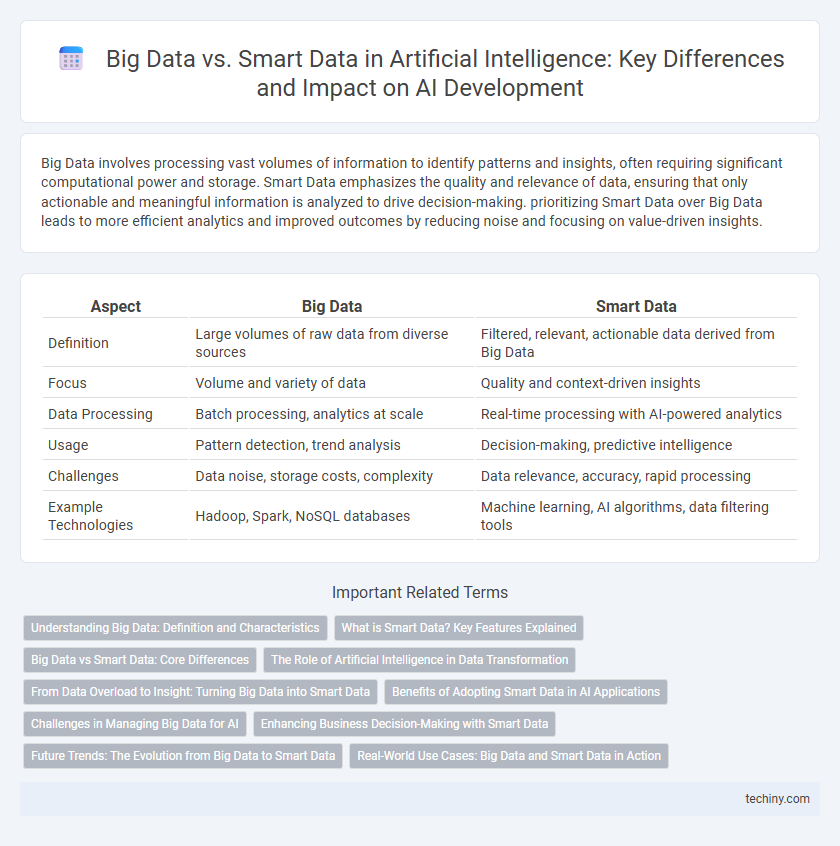Big Data involves processing vast volumes of information to identify patterns and insights, often requiring significant computational power and storage. Smart Data emphasizes the quality and relevance of data, ensuring that only actionable and meaningful information is analyzed to drive decision-making. prioritizing Smart Data over Big Data leads to more efficient analytics and improved outcomes by reducing noise and focusing on value-driven insights.
Table of Comparison
| Aspect | Big Data | Smart Data |
|---|---|---|
| Definition | Large volumes of raw data from diverse sources | Filtered, relevant, actionable data derived from Big Data |
| Focus | Volume and variety of data | Quality and context-driven insights |
| Data Processing | Batch processing, analytics at scale | Real-time processing with AI-powered analytics |
| Usage | Pattern detection, trend analysis | Decision-making, predictive intelligence |
| Challenges | Data noise, storage costs, complexity | Data relevance, accuracy, rapid processing |
| Example Technologies | Hadoop, Spark, NoSQL databases | Machine learning, AI algorithms, data filtering tools |
Understanding Big Data: Definition and Characteristics
Big Data refers to extremely large datasets characterized by the 3Vs: volume, velocity, and variety, which require advanced processing techniques for effective analysis. The exponential growth of data generated from sources like social media, IoT devices, and transaction records creates challenges in storage, management, and meaningful interpretation. Understanding these characteristics is crucial to leveraging Big Data for predictive analytics, trend detection, and informed decision-making in artificial intelligence applications.
What is Smart Data? Key Features Explained
Smart Data refers to refined, high-quality information derived from Big Data through advanced analytics, ensuring relevance, accuracy, and actionable insights. It is characterized by its ability to provide meaningful context, reduce noise, and support precise decision-making in AI applications. Key features include real-time processing, enhanced data governance, and integration of domain expertise to optimize data usability.
Big Data vs Smart Data: Core Differences
Big Data involves the collection and processing of vast volumes of unstructured or structured information, emphasizing quantity over quality to uncover patterns and trends. Smart Data refines this information by extracting relevant, actionable insights through advanced algorithms, prioritizing data accuracy, relevance, and context. The core difference lies in Big Data's broad data aggregation versus Smart Data's focused, quality-driven analytics aimed at enhancing decision-making in Artificial Intelligence applications.
The Role of Artificial Intelligence in Data Transformation
Artificial Intelligence accelerates the transformation of Big Data into Smart Data by extracting actionable insights through advanced analytics and machine learning algorithms. AI-driven tools process vast datasets to identify relevant patterns, anomalies, and trends with high precision, enabling more informed decision-making. The integration of AI enhances data quality, relevance, and usability, directly impacting the efficiency of business intelligence and operational strategies.
From Data Overload to Insight: Turning Big Data into Smart Data
Big data, characterized by its massive volume, variety, and velocity, often leads to data overload that hinders effective decision-making. Transforming big data into smart data involves advanced analytics, machine learning algorithms, and AI-driven filtering to extract relevant, actionable insights. This shift enables organizations to leverage precise information, enhancing predictive accuracy and driving data-informed strategies.
Benefits of Adopting Smart Data in AI Applications
Smart Data enhances AI applications by providing high-quality, relevant insights that improve decision-making accuracy and reduce processing time. Unlike Big Data, which often generates vast quantities of unstructured information, Smart Data refines data into actionable intelligence, optimizing resource allocation and operational efficiency. This targeted approach increases predictive analytics performance, enabling more precise AI-driven solutions across industries such as healthcare, finance, and manufacturing.
Challenges in Managing Big Data for AI
Managing big data for AI involves significant challenges such as data quality issues, including noise, redundancy, and inconsistency, which hinder accurate model training. The sheer volume and velocity of big data require scalable storage and processing capabilities, leading to high computational costs and latency problems. Ensuring data privacy and security while integrating diverse data sources also complicates the effective utilization of big data in AI applications.
Enhancing Business Decision-Making with Smart Data
Smart Data refines Big Data by filtering and structuring relevant, high-quality information to enhance business decision-making accuracy and speed. Leveraging AI-driven analytics, Smart Data enables companies to uncover actionable insights, reduce noise, and prioritize critical market trends for strategic advantage. Integrating Smart Data into AI systems accelerates predictive modeling, improves customer targeting, and drives efficient resource allocation.
Future Trends: The Evolution from Big Data to Smart Data
Future trends in Artificial Intelligence emphasize the shift from Big Data to Smart Data, where quality and relevance of data supersede sheer volume. Smart Data leverages advanced analytics and machine learning to extract actionable insights, enhancing decision-making accuracy and operational efficiency. This evolution supports real-time processing and personalized AI applications, driving the next generation of intelligent systems.
Real-World Use Cases: Big Data and Smart Data in Action
Big Data enables organizations to process vast amounts of unstructured information from diverse sources, powering applications like predictive analytics in healthcare and customer behavior analysis in retail. Smart Data refines this information by filtering and contextualizing it to deliver actionable insights, enhancing decision-making in areas such as personalized marketing and real-time fraud detection. Companies leveraging both Big Data and Smart Data strategies achieve superior operational efficiency and competitive advantage in dynamic market environments.
Big Data vs Smart Data Infographic

 techiny.com
techiny.com